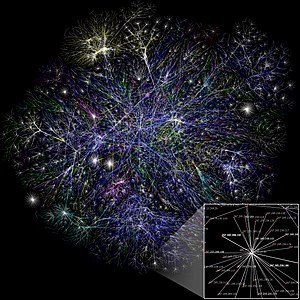
Back بوابة:إنترنت Arabic دەروازە:ئینتەرنێت CKB Portál:Internet Czech Portal:Internet German Portal:Internet Spanish درگاه:اینترنت Persian Portail:Internet French פורטל:אינטרנט HE Պորտալ:Համացանց Armenian Portal:Internet ID
The Internet PortalThe Internet (or internet) is the global system of interconnected computer networks that uses the Internet protocol suite (TCP/IP) to communicate between networks and devices. It is a network of networks that consists of private, public, academic, business, and government networks of local to global scope, linked by a broad array of electronic, wireless, and optical networking technologies. The Internet carries a vast range of information resources and services, such as the interlinked hypertext documents and applications of the World Wide Web (WWW), electronic mail, telephony, and file sharing. The origins of the Internet date back to research that enabled the time-sharing of computer resources and the development of packet switching in the 1960s which led to the design of computer networks for data communication. The set of rules (communication protocols) to enable internetworking on the Internet arose from research and development commissioned in the 1970s by the Defense Advanced Research Projects Agency (DARPA) of the United States Department of Defense in collaboration with universities and researchers across the United States and in the United Kingdom and France. The ARPANET initially served as a backbone for the interconnection of regional academic and military networks in the United States to enable resource sharing. The funding of the National Science Foundation Network as a new backbone in the 1980s, as well as private funding for other commercial extensions, encouraged worldwide participation in the development of new networking technologies and the merger of many networks using DARPA's Internet protocol suite. The linking of commercial networks and enterprises by the early 1990s, as well as the advent of the World Wide Web, marked the beginning of the transition to the modern Internet, and generated sustained exponential growth as generations of institutional, personal, and mobile computers were connected to the network. Although the Internet was widely used by academia in the 1980s, the subsequent commercialization in the 1990s and beyond incorporated its services and technologies into virtually every aspect of modern life. (Full article...) Selected articleMegatokyo is an English-language webcomic created by Fred Gallagher and Rodney Caston, debuting on August 14, 2000, and then written and illustrated solely by Gallagher as of July 17, 2002. The style of its writing and illustrations is heavily influenced by Japanese manga. Megatokyo is freely available on its official website, with updates on Monday, Wednesday, and Friday. It is among the most popular webcomics, and is published in print by CMX. Sales of the comic's print editions rank it as the best selling original English-language manga. Set in a fictional version of Tokyo, Megatokyo portrays the adventures of Piro, a young fan of anime and manga, and his friend Largo, a video game enthusiast. The comic often parodies and comments on the archetypes and clichés of anime, manga, dating simulations and video games, occasionally making direct references to real-world works. Megatokyo was originally presented in the gag-a-day format, with continuity of the story a subsidiary concern. Over time, it focused more on developing a complex plot and the personalities of its characters. This transition was due primarily to Gallagher's increasing control over the comic, which led to Caston's controversial removal from the project. Megatokyo has received praise from such sources as The New York Times, while negative criticism of Gallagher's changes to the comic has been given by sources including Websnark. Selected pictureNews
Wikinews Internet portal
WikiProjects
Did you know (auto-generated) -
Selected biography
Vannevar Bush (March 11, 1890 – June 30, 1974) was an American engineer and science administrator, known for his work on analog computing, his political role in the development of the atomic bomb, and the idea of the memex—seen as a pioneering concept for the World Wide Web. A leading figure in the development of the military–industrial complex and the military funding of science in the United States, Bush was a prominent policymaker and public intellectual ("the patron saint of American science") during World War II and the ensuing Cold War. Through his public career, Bush was a proponent of democratic technocracy and of the centrality of technological innovation and entrepreneurship for both economic and geopolitical security.
General images -The following are images from various internet-related articles on Wikipedia.
Selected quoteMore Did you know...
Main topics
Featured contentCategoriesRelated portalsThings you can do
Associated WikimediaThe following Wikimedia Foundation sister projects provide more on this subject:
Wikipedia's portals |
© MMXXIII Rich X Search. We shall prevail. All rights reserved. Rich X Search





















































